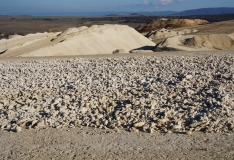 Bilogirski Vapniaky LLC, a subsidiary of Crimean Soda Plant JSC, launched its investment project in the field of development and mining of the Northern Baksan limestone deposit, located in Crimea.
Bilogirski Vapniaky LLC, a subsidiary of Crimean Soda Plant JSC, launched its investment project in the field of development and mining of the Northern Baksan limestone deposit, located in Crimea.
The new deposit is being developed to supply the Crimean Soda Plant with limestone, the raw material used for production of soda ash.
“We have already committed all the investments required for the project launch, and already began the development of this deposit and limestone mining. By obtaining its own raw material base, the Crimean Soda Plant will be able to reduce soda ash production costs by 10-15 percent. Reduction of the end product price will help increase our stake on the soda ash market,” explained Vladyslav Smelkov, Chairman of the Board of Crimean Soda Plant JSC.
According to Group DF, investments into the Northern Baksan deposit development project totalled UAH 120 million.
In 2010, Bilogirski Vapniaky LLC obtained a license from the Ministry of Environmental Protection of Ukraine to develop the Northern Baksan deposit over the period of 20 years.
During this time, the Crimean Soda Plant intends to mine 32 million tons of limestone from the Northern Baksan deposit. The annual limestone consumption of Crimean Soda Plant is estimated at 1.1 million tons.
“On the first stage, the production capacities of this deposit will allow us to mine 900,000 tons of limestone per year. According to the investment plan, this production capacity can be subsequently increased to 2.2 million tons per year. This capacity will be enough to fully supply the raw material demands of Crimean Soda Plant, as well as for the company to become a major trader on the limestone market,” explained Dmytro Nechytailo, Head of Non-Core Business Department of Group DF.
Implementation of this investment project has also made possible to create 100 new jobs.
NOTE
Limestone is used in the chemical and food industry as the raw material for production of soda, mineral fertilizers, glass, sugar and paper. It is used in oil refining, coal distillation, manufacture of paints, mastic, rubber, plastics, soap, drugs, rock wool, as well as for cleaning fabrics, leather processing, and soil liming.

